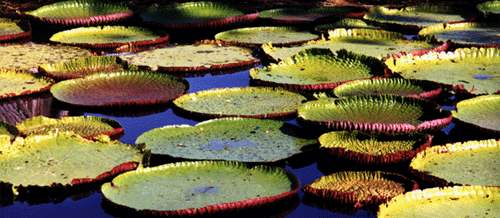Erik Mesoy
Core Tester / Intern
Many of the world's bodies of water represent ecological wildernesses.
The main problem is that all the food sinks to the bottom - where there is no light, and life is challenging. In very shallow waters, plants - such as kelp - can span this distance. If the sediments are stirred up nutrients can go into solution, creating algal blooms, allowing animal life to exist. Elsewhere, life tends to be scarce. It seems like much of the planet's surface is going to waste.
Using such bodies of water for practical purposes would be easier if their surfaces could be employed.
One obvious possibility involves constructing platforms on their surfaces.
With a small body of water, it may be possible to stretch a skin over the entire surface. If this is possible, it is probably the simplest solution. The skin would consist of a network of cables and floats, to provide structural support - probably with a membrane suspended on or above the surface.
However, on larger scales, it may not always be practical to stretch cables right across a body of water.
Tesselated rafts are an alternative solution.
These would be constructed from waterproof, stiff material.
Water lilies are a proof-of-concept for the idea:

[...]
Full page.
I think this is a very interesting idea. I originally came across it in connection with a proposal to accelerate global warming to end the current technically-defined ice age going on on Earth. While I think that's risky at present and will have high transition costs, the basic ideas and technologies involved seem very interesting and worth pursuing. The page goes on to discuss aquaculture and floating cities, which raises a number of questions about naval territory ownership and the like.
How worthwhile and/or important do you guys think it is to be reclaiming oceans as habitable area? What sort of ramifications would this have? What suggestions would you make on how it should work, legally, politically and otherwise? Does it seem feasible in the near future (50 years or so)?


